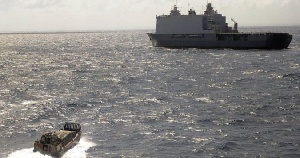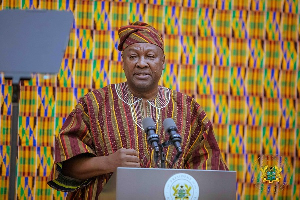After spending 34 days in captivity in the hands of pirates, three Korean sailors who were kidnapped on March 26, this year while fishing in Ghanaian waters near Keta in the Volta Region have been released.
The sailors were released in the wee hours of April 27 after a ransom was paid through an arrangement by their employers – World Marine Company Limited – and the Korean Embassy in Accra.
The three sailors — Mr Hyon Yong Ho, Captain of the vessel; Mr Kim LL-Dol, chief officer, and Mr Jeong Dae Young, chief engineer — were onboard Marine 711 when they were kidnapped and taken to the Bayelsa State in Nigeria.
The Commander of the Marine, Ports and Railways Department of the Ghana Police Service in Tema, Chief Superintendent of Police (CSP) Mr Joseph Antwi-Ababio, who confirmed the release to the Daily Graphic in Tema last Monday, said the Koreans were released to a hospital in Port Harcourt, Nigeria.
“There have been some releases and we have been working together with the Korean Embassy,” he said.
After regaining their freedom, the three were escorted by the Korean Navy to Ghana on April 30 to be reunited with their colleagues.
A source told the Daily Graphic that the negotiations for their release were facilitated by a third party contracted by the Korean Embassy in the country.
Meanwhile, a Ghanaian, Mr Jonathan Hammond, and his Greek business partner, Mr Andrianou Nicolaus, who were also kidnapped on March 26 by the same pirates while onboard a tanker vessel, the Constanteno, are still in captivity.
According to a source, their continued detention was due to the inability of their assigns to negotiate for their release.
Korean Embassy to the rescue
In a separate interview, the Director of the World Marine Company Limited, Mr Nketiah, commended the Korean Embassy in Ghana for facilitating the processes leading to the release of the company’s employees.
“If the Koreans had not come in and we had relied on the security agencies in the country, then nothing would have been done because these pirates are highly organised, but the Koreans are familiar with their operations and so they helped us to get a negotiator who assisted us,” he said.
Ransom paid
Although the government of South Korea had signed on to the ‘No negotiation with terrorists policy’, a rule followed by mostly Western countries not to negotiate with terrorists during hostage crises, a source familiar with the negotiations said “the Korean Embassy paid for the ransom, but World Marine will refund the money because that was the term of the agreement”.
The ‘No negotiation with terrorists’ policy is limited to not paying ransom demands and does not apply to other forms of negotiation.
The policy is intended to remove the incentive for taking hostages. It is assumed that for as long as a country applies the policy on a no-exceptions basis, terrorists can anticipate that there will be no reward for trading hostages.
Ghanaian’s dilemma
The Crime Officer in charge of the Marine, Ports and Railways Unit of the Ghana Police Service, Deputy Superintendent of Police (DSP) Mr Felix Asare, told the Daily Graphic on May 2 that “the Ghanaian and his Greek counterpart are still in captivity, but the police are aware that the hijackers are in contact with the family of Jonathan Hammond”.
Asked if the police were involved in the negotiations that released the kidnapped Korean sailors, he said: “We do not know that much.”
“Not even the process that brought the release of the Korean sailors is known to us yet, so we are still talking to the embassy to get some briefing,” he added.
On what arrangement the country had for the Ghanaian captive, DSP Asare said it was only after a briefing from the Korean Embassy that the police would be able to determine the next step to take.
Background
About 3:30 a.m. on March 26, this year, a speedboat powered by two outboard motors and carrying nine persons suspected to be Nigerians approached a vessel in the Tema anchorage area and commanded the crew on the vessel to weigh anchor.
But, on realising the intentions of the kidnappers, the crew informed the bandits that there was insufficient fuel in the vessel to make the journey.
That caused the armed bandits to hijack another vessel, an oil tanker then operated by the Ghanaian still in captivity, Mr Hammond, and his business partner, Mr Nicolaus, and took them hostage.
The pirates took Mr Hammond and his business partner onto the Marine 711, which was fishing in Ghanaian waters near Keta, and kidnapped its captain and two others, before locking up all 45 crew members on board the vessel into a cabin and then headed towards the Bayelsa State in Nigeria.
Spike in piracy
Piracy and armed robbery in the Gulf of Guinea are becoming rampant and are a source of worry to players in the maritime sector.
A report by the International Bureau on Piracy and Armed Robbery Against Ships stated that there had been 11 separate pirate attacks between 2013 and 2017 off the country’s coast.
However, between January and April this year alone, the Ghana Navy reported five separate pirate attacks in Ghana’s territorial waters.
General News of Friday, 4 May 2018
Source: classfmonline.com













